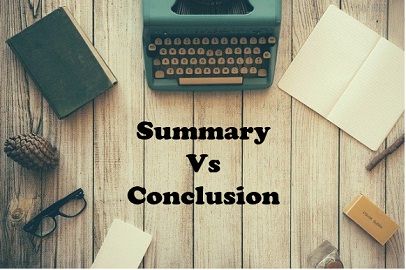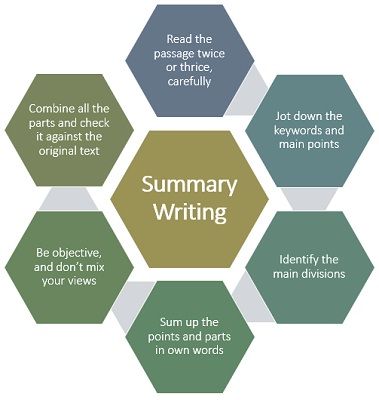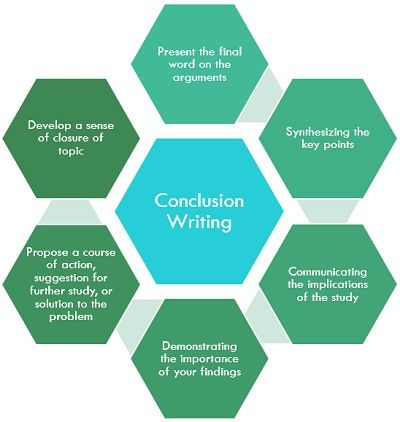 Conclusions are as difficult to write as an introduction, because, it decides whether the work is worth your time or not. Both of them have a long-lasting impact on the reader’s mind. While an introduction moves from general to specific, conclusion moves from specific to general. A conclusion is an afterword which contains the gist of something, reached after considering all the important points.
Conclusions are as difficult to write as an introduction, because, it decides whether the work is worth your time or not. Both of them have a long-lasting impact on the reader’s mind. While an introduction moves from general to specific, conclusion moves from specific to general. A conclusion is an afterword which contains the gist of something, reached after considering all the important points.
In the absence of conclusion, the research paper might seem incomplete. It is often contrasted with a summary, but there are subtle differences between the two. A summary is nothing but a short and clear account of the text, covering the main points, facts or elements only.
Content: Summary Vs Conclusion
Comparison Chart
| Basis for Comparison | Summary | Conclusion |
|---|---|---|
| Meaning | Summary refers to the concise statement or account of the key points of a text, research or essay. | The conclusion is that section of the text, essay or book which serves as the final answer to the research question. |
| Purpose | To outline the vital points. | To arrive at a decision or judgement by giving a reason. |
| What does it do? | It restates the main elements or attributes, which have been discussed already. | It synthesizes and wraps up the topic. |
| Length | 5% to 15% of the original material | Only 10% of the original material |
| Presents | Central ideas clearly and briefly. | Implications, recommendations, findings, next step and lessons learned. |
| Ideas and criticism | Does not include the writer's ideas and criticisms | Includes writer's ideas, reactions and criticisms |
Definition of Summary
A summary is the compact account of the main text, i.e. an article, essay, drama, or some other form of literature. It gives an overview of the key points of the piece of writing. Moreover, one can also summarize anything which he/she has seen and heard, like speech, movie or lecture, etc.
It is typically about 5% to 15% of the original work, i.e. it may extend up to one to three paragraphs, which is around 100 to 300 words. It simply depends on the length of the text which is summarized. Its aim is to describe a piece of writing while including considerably less content than its original.
It not just saves the time of the reader but also filters the information.
Ideal Summary
- An ideal summary is one that objectively highlights the entire form of literature.
- It should cover the focal point of every paragraph and the evidence supporting it.
- It should exclude all the irrelevant examples, details and information.
- It can make use of the keywords used in the original work, but should not use the same sentences and phrases, except if quotation marks are used.
- It must express the sense of the original work while using your own words and sentences.
Definition of Conclsuion
Conclusion refers to the epilogue which is given at the end of something, to deduce the findings. It forms part of the thought process, which combines all the points discussed, so as to reach a comprehensive idea or statement.
It is the final step in the process of reasoning, in which judgement, decision or opinion is formed after complete investigation and consideration. To conclude something, different types of perspectives are considered. It is only 10% of the research paper, which has two segments – summary and final thought.
With a conclusion, the researcher can have a final say on the arguments listed in the paper. It also weaves the thoughts, presents the significance of the ideas and pushes the readers to have a new outlook of the subject.
Ideal Conclusion
- The conclusion is said to be ideal when it gives an interesting insight and should end on a positive note.
- Highlights the main argument presented in the piece of writing.
- Sums up the answer to the question, often stated in the introduction.
- Refer back the questions, states the key points and findings, and wind up the discussion with the final observation.
- Reinforces the primary theme of the study.
- Makes a strong and long-lasting impression on the reader.
- It should never introduce new points.
Key Differences Between Summary and Conclusion
The points stated below discuss the differences between summary and conclusion:
- A summary is an abridgement of the work of literature, which covers the key points succinctly. On the contrary, conclusion refers to the final part of the discourse which sums up the argument and gives a statement of opinion or judgement.
- A summary is written to provide the reader with a precise and objective narrative of the central ideas and aspects of the original text. Conversely, conclusion paragraph wraps up the text and presents the reader that you have accomplished, what you have set forth in the beginning.
- While a summary restates the facts and elements, which are discussed in the original text, conclusion tends to synthesize all the points and wrap up the discussion. It helps the reader understand the importance of the research.
- Ideally, the length of the summary is 5% to 15%, whereas the conclusion constitutes only 10% of the original work.
- A summary often demonstrates the central ideas of the text clearly and concisely. In contrast, the conclusion introduces a new outlook, proposes a course of actions, provides a solution to the problem, makes suggestions for further study, and makes deductions on the basis of the argument.
- A summary only includes the ideas of the original text. One should not insert their opinion, criticism, comments or interpretations. As against, the conclusion can include the researcher’s or writer’s views, ideas and criticisms at the end.
Conclusion
In a nutshell, a summary condenses the material as well as it informs the reader about the vital points. Contrastingly, a conclusion gives the reader the sense of completeness of the argument or topic, with a reason or final thought. It focuses on the final outcome of the argumentation or research.






essay ordering says
Irresistible! Thank you a lot for this type and precise carrier.your offerings is higher than higher.
Atti says
I will recommend my students to visit and read the explanation you give here. Thank you.
Endalkachew Sisay says
I really appreciate the points you have addressed for us. Keep up the good work!!!